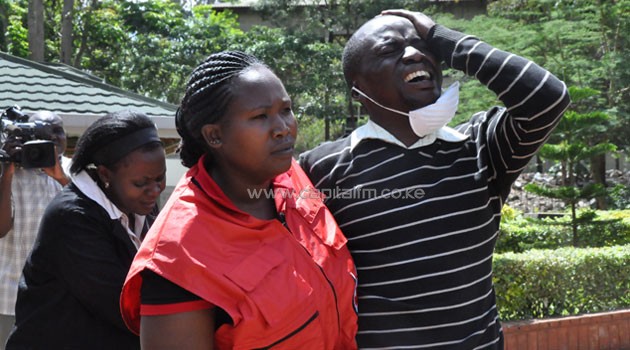
But at the pull of a trigger, joy turned into sorrow and what were to be happy family reunions turned grief-stricken/MUTHONI NJUKI
NAIROBI, Kenya, Nov 23 – They sat huddled in groups outside the Chiromo mortuary; here to identify the bodies of their loved ones.
Some came the night before but due to the lateness of the hour, they were unable to do so.
Now when the Kenya Red Cross calls for them, they surge forward, pushing and shoving, keen to see for themselves and maybe finally accept, what many of them already know in their hearts to be true.
They go in via one door and out through another but for many, the grief is simply too heavy to bear; too heavy for their mortal limbs to carry and so they collapse into the arms of another – a family member, a friend or simply a volunteer.
One of the first to walk out of the mortuary is 26-year-old Chrispinus Ayeme, an actor. But even for him, putting on a brave face is too much to ask. He breaks down and weeps into his hands. He weeps for his younger brother, 24-year-old Patrick Ouko. READ: Gunmen execute 28 on Kenya bus near Somalia border
“They shot him in the eye so his face is completely disfigured. I identified him using his feet. If I hadn’t grown up with him I don’t think I could have identified him.”
Now he bears the unenviable burden of not only confirming his brother’s death to his mother who is in Western Kenya, but of preparing her for the sight of her son’s body as well.
Nobody has to break any news to James Kilonzi because he was not far behind Chrispinus and he saw for himself what the Al Shabaab terrorists did to his daughter. “What benefit is there to shooting someone in the eye?” he poses to no one in particular.
Just like Patrick, his daughter Mary was a teacher in her 20s – 27 to be exact. And she was on her way home (Mwingi) for the holidays when she met her demise.
The news of her death was of particular shock to James, a cleaner who lives in Kariobangi, because she was not meant to be on the 3am bus that was ambushed. “She switched tickets because she couldn’t wait to see us.”
Now he sits and waits under the shade of a tree, waiting to hear how the government plans on helping him bury his daughter. “I have nothing. My wife died six months ago and I’ve put everything I’ve ever made into putting Mary and her siblings through school. They were my retirement plan.”
But he doesn’t cry. He nurses his anger. “It’s so unfair. She went so far away from home to help educate other people and the very same thankless people put a bullet in her brain. Never again will I allow a child of mine to go there. Forget the money.”
Samuel Omwando is angry too. He lost a nephew and he’s livid at the national government because by his estimation, they haven’t done enough to secure Kenya’s border with Somalia. “It’s the same empty rhetoric day in day out,” he explains.
But while he may have the strength to vent his frustrations, “I know enough,” he says, not to go into the mortuary. READ: Shabaab Islamists claim responsibility for Kenya’s deadly bus attack
Richard Bundi, another of the late 26-year-old Dennis Biese’s uncles, goes in his stead.
But it’s not the same, stoic, man who emerges; his hands on his head, he fails to contain his grief.
“This is just too much,” he manages to get out.
Too much, Samuel explains, because Dennis – who worked as a clinical officer in the Mandera District Hospital – had only just married and so not only did he have four siblings to support, but a wife and child as well.
“The baby isn’t even two years old yet. He tried to get his wife as a job as a teacher in Mandera but he was unsuccessful. Now we’re glad. Ever since his mother died from cancer, he’s been the sole breadwinner.”
“He was the best,” Richard says. “Just ask those who worked with him.”
Augastino Musicha should know just how committed those who were killed alongside Dennis were to their jobs. He lost five of his colleagues in Saturday’s daybreak slaughter.
“They were teachers. One of them was my cousin. I could have been on that bus if I hadn’t come down (to Nairobi) a week earlier. I don’t think I’m going back (to Mandera). I can’t go back. How can I go back when the government that sent me there can’t even protect me?”
There is no going back for the 28 young men and women who packed their belongings and moved half way across the country to serve their country only never to return home.
“We were going to celebrate Christmas together. We spoke on Thursday and I remember he was looking forward to coming home,” Shem Mwanga recalls from his last conversation with his nephew Neville Muliro.
But at the pull of a trigger, joy turned into sorrow and what were to be happy family reunions turned grief-stricken.
The lives of their children, brothers and nephews snuffed out because they were on the wrong bus at the wrong time. When men intent on inflicting pain hijacked them on a rainy Saturday morning and killed them for the crime of not subscribing to the ‘right’ religion.









































